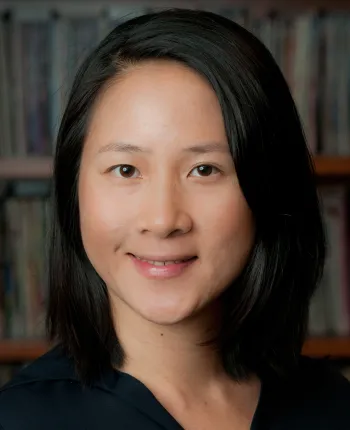
Nadia R. Roan, PhD
Education
- BA, 2001. Molecular and Cellular Biology, University of California Berkeley, CA
- PhD, 2007. Biological and Biomedical Sciences, Harvard Medical School, Boston, MA
Biography
Nadia Roan, PhD, received her undergraduate training from the University of California Berkeley, where she graduated with an honors degree in Molecular and Cellular Biology. She then completed her PhD in the Biological and Biomedical Sciences Program at Harvard Medical School studying T cell responses to the bacterium Chlamydia trachomatis. She conducted her postdoctoral studies at the J. David Gladstone Institutes located at University of California San Francisco (UCSF), where she studied the mechanisms by which host factors in mucosal secretions influence HIV infection. Dr. Roan is currently Full Professor at UCSF, and a Senior Investigator at Gladstone Institutes. Her lab uses a variety of single-cell technologies paired with bioinformatics approaches to define the properties of T cells, and how they can be beneficial or detrimental in the context of HIV transmission and persistence. These technologies include the development of a variety of CyTOF panels to characterize the protein and glycan features of HIV-infected cells, computational approaches to trace reactivated reservoir cells to their pre-stimulated states, and multi-omics single-cell sequencing approaches to define the transcriptome, surface proteome, and clonal expansion histories of HIV reservoir cells from ART-suppressed people living with HIV.
Research Interests
Dr. Roan has had a long-standing interest in studying the interplay between immune cells – particularly T cells – and viral pathogens. Her current research focuses in three major areas:
First, her lab is studying the interactions between HIV and T cells, in the context of HIV transmission, pathogenesis, and persistence. Her lab has discovered a variety of mucosal factors, including factors in seminal plasma and resident cells of genital tissues, that increase HIV infection of CD4+ T cells, the main target cells of HIV. Her lab is also studying the intrinsic features of different subsets of CD4+ T cells that render them more or less susceptible to HIV infection, including both productive and latent infection. For these studies, her lab has developed multiple CyTOF panels, single-cell sequencing based approaches, and computational pipelines. These tools are also being applied to study the mechanisms of HIV persistence in the face of antiretroviral therapy, as well as to study natural control of HIV in rare individuals termed elite controllers and post-treatment controllers.
Second, her lab is studying T cell immunity in the context of COVID-19, vaccination, hybrid immunity, and Long COVID. For these studies, the lab has developed CyTOF panels to deeply characterize the phenotypes, effector functions, and other attributes of SARS-CoV-2-specific CD4+ and CD8+ T cells. These studies currently focus on understanding the immune dysregulation that occurs during Long COVID, including in a mouse model that was developed with colleagues at the Gladstone Institutes.
Third, her lab is using various omics tools to study immune cells of the endometrium in the context of reproductive health and pregnancy. These studies include characterizing viral-specific T cells in this unique tissue highly influenced by sex steroids. Her lab is also investigating how various components of human seminal plasma can affect infection by viral pathogens and fertility.
Postdoctoral fellows and graduate students who have experience in microbiology and/or immunology are encouraged to apply for postdoctoral training in the lab of Dr. Nadia Roan. Interested applicants should send their CV and names of three references to: [email protected]
Academic Contact
Contact:
415.734.4883 (Phone)
415.355.0855 (Fax)
Physical Address:
The J. David Gladstone Institutes
University of California San Francisco
1650 Owens St.
San Francisco, CA 94158